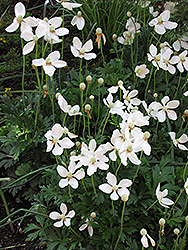Snowdrop Windflower
Anemone sylvestris 'Grandiflora'
Plant Height: 12 inches
Flower Height: 18 inches
Spread: 12 inches
Sunlight:
![]()
![]()
Hardiness Zone: 4
Description:
Delicate nodding white flowers atop lusterous green dense foliage; a low maintenance groundcover for bright shade; overwinters well if protected from heavy rain and snowmelt; flowers give way to interesting white wooly fruit
Ornamental Features
Snowdrop Windflower has masses of beautiful white daisy flowers with tan eyes at the ends of the stems from late spring to early summer, which are most effective when planted in groupings. Its deeply cut ferny leaves remain forest green in color throughout the season. The fruits are showy white pods displayed in mid summer.
Landscape Attributes
Snowdrop Windflower is an herbaceous perennial with a more or less rounded form. Its relatively fine texture sets it apart from other garden plants with less refined foliage.
This plant will require occasional maintenance and upkeep, and should be cut back in late fall in preparation for winter. Deer don't particularly care for this plant and will usually leave it alone in favor of tastier treats. Gardeners should be aware of the following characteristic(s) that may warrant special consideration;
- Spreading
- Self-Seeding
Snowdrop Windflower is recommended for the following landscape applications;
- Mass Planting
- General Garden Use
- Groundcover
- Naturalizing And Woodland Gardens
Planting & Growing
Snowdrop Windflower will grow to be about 12 inches tall at maturity extending to 18 inches tall with the flowers, with a spread of 12 inches. Its foliage tends to remain dense right to the ground, not requiring facer plants in front. It grows at a fast rate, and under ideal conditions can be expected to live for approximately 10 years. As an herbaceous perennial, this plant will usually die back to the crown each winter, and will regrow from the base each spring. Be careful not to disturb the crown in late winter when it may not be readily seen!
This plant does best in full sun to partial shade. It prefers to grow in average to moist conditions, and shouldn't be allowed to dry out. It is not particular as to soil type or pH. It is somewhat tolerant of urban pollution. This is a selected variety of a species not originally from North America. It can be propagated by division; however, as a cultivated variety, be aware that it may be subject to certain restrictions or prohibitions on propagation.
